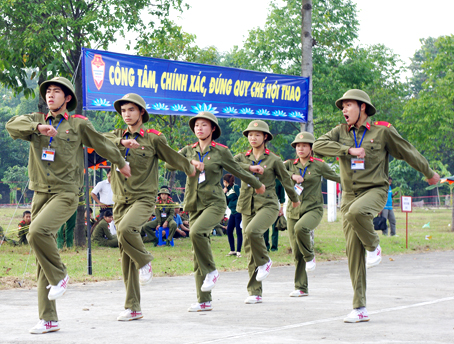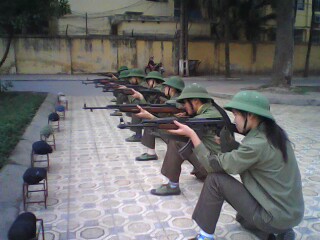Law on National Defense and Security Education – A new move towards building a strong all-people’s national defense
At the 13th tenure National Assembly’s fifth session on June 19th 2013, Law on National Defense and Security Education was passed. Accordingly, this law will officially take effect on January 1st 2014. This is a new move towards institutionalizing the Party’s viewpoint, enhancing the effectiveness of state management over national defense and security education, meeting the demands of national construction and protection cause in the new era.
 |
|
Students in universities are equipped with national defence-security education |
Realizing the position and function of national defense and security education (NDASE) in the education strategy aimed at developing people comprehensively, meeting the demands of national construction and protection, since 2011 the Politburo have issued 02 directives (Directive 62-CT/TW, and Directive 12-CT/TW); the Government have issued 02 decrees (Decree 15/2001/NĐ-CP and Decree 116/2007/NĐ-CP).
Since the publication of the directives and decrees, party committees and authorities at all levels have paid due attention to leading, directing, and carrying out the work with increased effectiveness and professionalism, making a change in both responsibility and perception of the whole Party, people, and Army of the mission of national construction and protection, contributing to maintaining political security, public order and safety, and creating preconditions for socio-economic development and defense and security enhancement. However, these documents have not been of high legality; their effects have not been widespread, methods of implementation have not been fully efficient and synchronous. These have caused difficulties for the implementation of NDASE, affecting the quality and effectiveness of this work.
 |
|
Students practising drill |
In the context of complicated and unpredictable changes in the world and regional situation, with embedded risks of instability, our country continues the cause of renovation, enhances industrialization, modernization, and international integration in both depth and width. Beside advantages, we also cope with various difficulties and challenges, especially sabotages of the hostile forces through their schemes of “peaceful evolution”. This situation has resulted in ever-increasing demands on the Homeland’s protection. Thus, the promulgation of the law on NDASE is of vital importance, contributing to institutionalizing this work nationwide. This is a new move in the thinking of the Party, firstly in the building of national defense and security. This law lays an important foundation for strengthening the leadership of the Party, the effectiveness of state management over defense and security in general and NDASE in particular; contributing to developing comprehensive people with expertise, patriotism, revolutionary vigilance, basic knowledge in national defense and security and necessary military skills to meet the demands of national protection.
The law consists of 8 chapters, 47 articles. Chapter One introduces general provisions; Chapter Eight contains Implementation Provisions. Chapters Two, Three and Four discuss three most important areas, also 3 main missions of NDASE (NDASE in schools, advancement of knowledge in national defense and security for targeted subjects, and promulgation of knowledge in national defense and security for entire people). Chapters Five, Six and Seven stipulate teachers, lecturers, speakers, propagandists of NDASE; budget for NDASE; rights and responsibilities of agencies in charge of NDASE. This is the comprehensive supplement and development of NDASE law in comparison with Governmental Decrees in order to ensure strict, synchronous and unified enforcement nationwide.
That development is shown as follows: Chapter One. General Provisions stipulates governing scope, applicable entities, aims, principles, policies, benefits, obligations of citizens towards NDASE. Article 1, Governing scope, stipulates principles, policies, basic content, mode; missions, rights of agencies, organizations, rights and obligations of citizens towards NDASE. Applicable entities of the law include not only Vietnamese agencies, organizations and citizens but also foreign organizations and individuals living and operating in Vietnam (Article 2). To ensure the harmonious combination between rights and obligations of citizens, Article 7 stipulates that: “Citizens have rights and responsibilities to study to gain knowledge in national defense and security. Participants in NDASE get benefits from policies and mechanisms as regulated by law”. Based on the operational results of NDASE centers in the past years, the law stipulates that NDASE centers are education entities specializing in advancement of knowledge in national defense and security and military skills. These include NDASE centers in army schools and those in civilian universities. This regulation is not new, but its connotation has been developed in an “open” direction. This will be the basis for the Ministry of National Defense, Ministry of Education and Training to continue guiding localities, educational institutions to promote the strengthening and establishment of NDASE system, meeting the ever-growing needs of the society, ensuring the specific characteristics of NDASE.
Chapter Two. NDASE in educational institutions. Beside high school and college students, for the first time NDASE for pupils in primary and secondary schools is also stipulated in the law (Article 10). This regulation is aimed mainly at ensuring the logic, system, synchronicity and development trends of NDASE. Chapter III. Advancement of knowledge in national defense and security. In comparison with Decree 116/2007/NĐ-CP, subjects of NDASE, as stipulated by this law, have more specific governing scope and go into detail. To promulgate knowledge in national defense and security for state agencies, political organizations, social and political organizations, this law clearly defines its subjects: cadres; officials; elected members of the National Assembly and People’s Council; state-owned enterprise (SOE) managers; non-specialized activists in communes, wards, towns; village headmen and heads of organizations in hamlets, mountain villages; members of the Communist Party of Vietnam. Also, drawing on practical experience, this law stipulates the promulgation of knowledge for non-state-owned enterprise managers (enterprises of medium-size and above; enterprises in support of defense and security, enterprises operating in remote, border and island areas) and managers of non-public units. The advancement of knowledge in national defense and security for typical individuals, prestigious people in community includes religious dignitaries and sub-dignitaries, village headmen, patriarchs, cultural, social, scientific and artistic activists
 |
|
Students practising firing |
Chapter IV. Promulgating knowledge in national defense and security for entire people. Besides regulations on contents and forms of promulgating knowledge in national defense and security for entire people, this chapter also specifies the task of promulgating knowledge in national defense and security for residents in border, island, mountain and remote areas (Article 21). These are focal areas of national defense and security which require close combination between safeguarding sovereignty and territorial integrity with maintaining social order and security, building borders of peace and friendship, and crime prevention and control. Furthermore, the law also widens its governing scope of promulgating knowledge in national defense and security among employees in non-state-owned enterprises and non-public units. This regulation is to link employees’ rights and obligations with those of employers, ensuring the equality for all citizens before the law.
Teachers, lecturers, and propagandists play an important role in NDASE. Chapter Five specifies the training, employment as well as roles, responsibilities, and benefits of this working group.
In order to make the law come into force soon, functional organs and agencies involved in NDASE should perform well the following tasks:
First, it is necessary that a plan of enforcement be proposed to the Prime Minister soon, serving as a foundation for ministries and branches to issue documents specifying details and timely and synchronously guiding the implementation, ensuring the coming into force of the law by January 1st 2014.
Second, it is essential to timely perfect NDASE councils at all levels; establish and maintain operating regulations; implement their function as the advisory organ for party committees, authorities, heads of agencies, organizations, enterprises, and public units on matters of leading, directing, and carrying out the supervision and inspection of the enforcement of the law.
Third, it is important to actively open training courses to raise responsibility and awareness for cadres at all levels of the law and guiding documents to enforce the law at each level and branch.
Fourth, it is necessary to promote propagation on mass media, ensuring that all cadres, party members, levels, branches and people grasp, study and continuously upgrade their awareness of the law.
Fifth, it is essential to shorten the time and roadmap of quality standardization for teachers, lecturers of NDASE; timely revise, supplement system of course books and documents in NDASE in line with the law and reality.
Major-General Nguyen Duy Nguyen
Director of the Department of Militia and Self-Defense